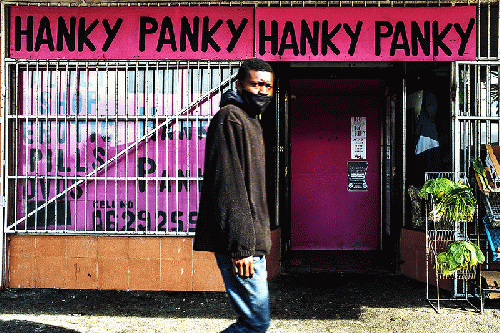In boxing, there are bangers and dancers, but the very best, a Meldrick Taylor, say, could concuss and rupture yet still pirouette with finesse. If you waltz too much, you'll lose fans. Even with a perfect record of 50-0, cake walking Floyd Mayweather has detractors.
South African Corrie Sanders was no juking p*ssy. Although his main passion was golf, "The Sniper" had enough balled viciousness to crumble opponents, including Wladimir Klitschko, with a hammering left. Retired, Sanders was murdered by three young Zimbabweans during a robbery at his nephew's 21st birthday party. Shielding his daughter, the bleeding Sanders told her to pretend to be dead.
Even famous South Africans aren't spared of this country's casual mayhem. At 82-years-old, Nadine Gordimer suffered a home invasion by four blacks.
Gordimer's solution, "South Africa needs a huge jobs program, like what Roosevelt did in the United States. That will prevent youth from turning to crime."
South Africa's official unemployment rate is 32.6%. For those aged 15 to 34, an astounding 46.3% are jobless.
In Cape Town, the poorest are generally in the black townships, with many living in shacks. The homeless, including coloreds and whites, can be seen in nearly all neighborhoods, however. On Longmarket, they collapse, with chichi Tjing Tjing and Mochi Mochi just across the via via. They sleep right outside the grand Parliament complex, with its equestrian statue of Louis Botha, "FARMER / WARRIOR / STATESMAN." Despite protests and vandalism, Botha's still riding high.
At many intersections, there are beggars, with some wearing shirts advertising businesses even. In Bellville, two white women approached me, with one pleading, "We are decent people, but my mother is sick today." Following me for a block and a half, a colored man kept hustling me for more change, so he could buy milk for his baby, he claimed. A young black man with carved giraffes stated, "I'm not a beggar, I'm an artist, but I've made nothing today. Please give me something, sir, for my baby?"
There are also "car guards" who will direct a motorist to a parking space, help him park, rather unnecessarily, I'd think, then watch over his car, for a small tip. If you're rude to one, he might just run a key along your gleaming BMW. As a rule, though, they're unintrusive, courteous and don't beg. Seeing all these black men in yellow reflective vests, I had mistaken them for municipal employees.
Though bad enough, Cape Town's homeless crisis is not as visible as, say, in Los Angeles or San Francisco.
One day before dawn, I walked two miles from Kloof to the taxi van depot. In the dark, I passed a bunch of people, all black, going to work. Three young women cheerfully chattered.
On Upper Orange, stately houses lurked behind tall walls topped with electric fencing. Cold enough, I hunched. From inside a crude, weather-beaten tent, a man and a woman muttered.
On Buitenkant, there was a wood fire under a battered black pot. From the plastic-covered dwelling next to it, a stooping, thin crone emerged. Down the sidewalk, more disheveled hovels slumped.
At a bus stop, a McDonald's ad for its Grand Chicken Special seemed like a taunt, almost. What a lusciously lekker stack! I've seen homeless of all colors digging through trash cans for food.
Like in most European cities, Cape Town's downtown is anchored by its train station. This has become a shell of itself, however. None of the electric departure and arrival boards work. Tracks are mostly forlorn, there are few shops and the outside has become an open black market, with vendors selling fruits and vegetables.
(Note: You can view every article as one long page if you sign up as an Advocate Member, or higher).






